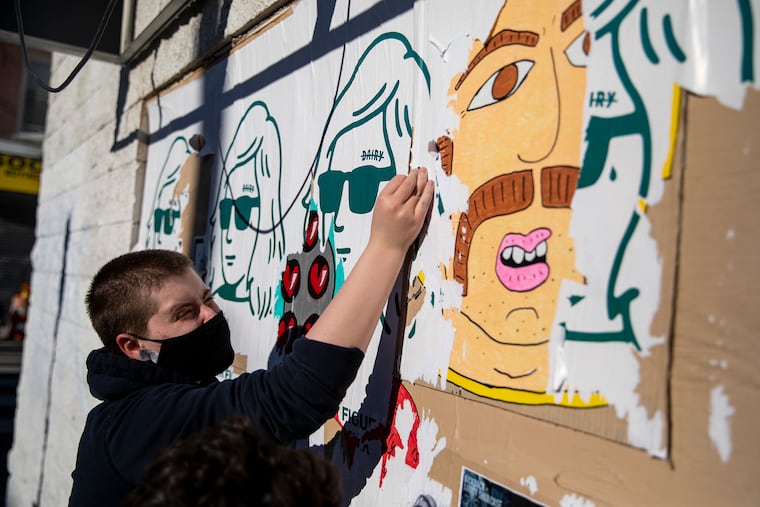Oat milk company faces criticism from artists after covering Philly street art with ads
In the world of Philadelphia street art, there’s one rule — don’t cover up anyone else’s work. But that’s what one company did when it launched an oat milk advertising campaign.

In the world of Philadelphia street art, there’s one rule — don’t cover up anyone else’s work. But that’s what a London-based coffee products company did when it launched an oat milk advertising campaign in the city.
Rows and rows of posters promoting Minor Figures’ plant-based cow’s milk substitute were glued on top of existing street art in at least five locations last week. Some of the covered work thanked essential workers. Another mural covered with ads had been commissioned by President Joe Biden’s campaign to promote voting.
Local artists and art enthusiasts in a city that reveres its vibrant murals criticized the company for harming the street-art scene its ads tried to imitate. Some have even started tagging the oat milk posters with graffiti or tearing them down.
“Everyone knows you don’t go over someone else’s artwork unless you have permission,” said Samuel Rodriguez, one of the artists whose work was defaced. “Why didn’t this company know or care? Because of greed.”
» READ MORE: New 5th Street subway murals tell a more expansive story of the city’s history
Mural Arts executive director Jane Golden said she was “quite disappointed” that some of the group’s work had been affected.
“Minor Figures is very presumptuous to come to our city and cover works of art in such an offensive manner,” Golden said.
Since the posters appeared in Philadelphia, Minor Figures’ inbox and social media accounts have been inundated with calls to boycott its products, which are sold at Whole Foods and other specialty grocers in California, New Jersey, New York, Oregon, Washington, and Texas, as demand for oat milk has exploded in recent years.
Reached by phone in London, Minor Figures CEO Stuart Forsyth apologized and conceded that the ad campaign in Philadelphia had gone “horribly wrong.” He also admitted to initially misjudging the gravity of the error.
“Our posters have unfortunately been posted over important local community artworks, which was a mistake,” Forsyth said. “We take full responsibility, and we are working to rectify this in the most appropriate way.”
» READ MORE: 11 Philadelphia artists are behind the murals at the Fashion District
Solving the problem won’t be easy, though.
A local advertising firm Forsyth declined to name hung dozens of the posters, which feature a simple, edgy drawing of a woman’s face, using adhesive. Removing them from the artwork underneath is like separating two layers of wallpaper.
The damaged Biden campaign mural on South Broad Street was installed on plywood boards hung from a brick wall. Removing the boards and preserving the mural was always part of the plan, Rodriguez said. Now, he and another artist who worked on the project say they’re unsure if the work can be salvaged.
“I’ve been painting murals in Philadelphia for 20 years, and I’ve never had any of my work defaced,” said Ernell Martinez, the other artist. “The blatant disregard for public art is quite shocking.”
The damage done to this mural is even more painful, Martinez said, because a group of young Black and Latino men helped them paint and install it.
He accused Minor Figures of targeting Philadelphia street art to generate publicity.
Forsyth denied that but said he understood the point.
“I’ve been scratching my head about what the solution is,” Forsyth said. “I guess we can always make more art.”
Other locations targeted include the former location for Nourish, a cafe that moved after a fire, and Union Transfer, the Spring Garden Street concert venue.
Many artists learned of the problem with the oat milk ads when they saw it featured on StreetsDept.com, a website and associated social media accounts run by photographer and curator Conrad Benner. He said he opposes outdoor advertising and hopes companies think twice before launching similar campaigns.
“These sacred spaces should be reserved for local artists. Folks use them to reflect the world around them,” Benner said. “This company had no goal other than to get money out of our pockets.”